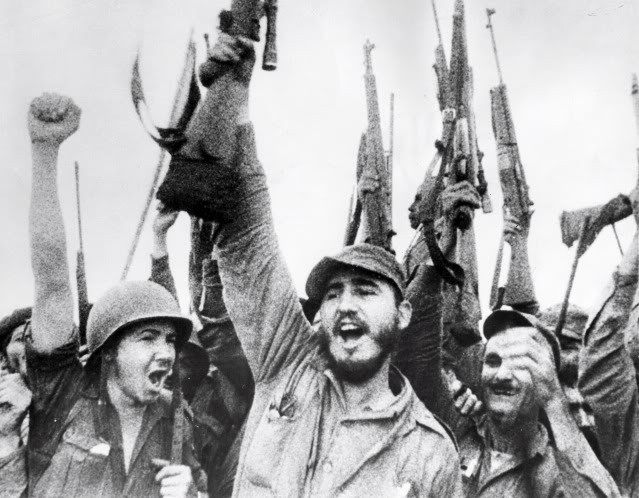This is the first article in the new YCL history series “On this day”. The series will focus on giving an analysis of important, and indeed interesting, historical events of the distant and near past. The aim is to promote discussion, draw lessons from the past and give a Marxist analysis of history as opposed to the ‘Great Man theory’ of bourgeois ‘his-story’. It is also important to celebrate and commemorate great successes and events in the history of the international working class and communist movement. We hope the articles will accumulate into an eclectic mix which is both informative and fun to read.
It so happens that the first article is published today 02/12/2013, 57 years since the the Granma landed on the Playa Las Coloradas in what was then Oriente Province, in the south of the Cuba. Obviously this was an historic moment in the story of the Cuban revolution. Written by Johnnie Hunter.
The Granma had left Tuxpan in Mexico just after midnight on the 25th of November. Although only designed to carry 12 crew it had 82 members of the 26th of July Movement crowding it’s decks.
The planning and rehearsing for the landing was extremely detailed. Frank Paiz and Celia Sanchez had made preparations on the Cuban mainland for their arrival. Despite this from the beginning they suffered serious setbacks. For a start the Granma arrived two days later than scheduled because it was so heavily overladen. In the first battle at Alegria de Pio with Batista’s troops they suffered very heavy losses and were left scattered in the Sierra Maestra mountains.
However Castro and his comrades managed to regroup to begin what was to be a long guerilla war against the brutal Batista Regime.
The guerilla tactics of the 26th of July were remarkably successful. Throughout their time spent in the mountains mustering forces and skirmishing with the Cuban army they gained the esteem of the local peasants there through strict discipline and respect for their property.
This was of great strategic importance in terms of gaining supplies and keeping supply lines open, but also in terms of intelligence gathering and so as to prevent them from being betrayed to the regime. Furthermore during the later stages of the war and once the revolution had triumphed,there still existed this broad worker-peasant coalition in support of the 26th of July movement.
The attitude and strategy of the revolutionaries with regards to captured pro-Batista soldiers is also impressive in terms of it’s foresight and pragmatism. The 26th of July always sought to avoid executing and always aimed to release surrendered or capture enemy combatants.
I think clearly this says something for the humanity of those brave Cuban comrades, but more materially it was of great symbolic importance in propaganda terms. Plus it meant the next time you engaged these men they were more likely to surrender since they know they will be well treated. Plus if you develop a reputation for massacring surrendered men, in future the opposing forces will be far more minded to fight to the death.
 The 26th of July gradually increased in strength and gained ground and greater fighting capability. After repulsing Batista’s Ofensiva they launched a counter-attack that inflicted defeat after defeat upon the regime. Batista eventually fled to the Dominican Republic on the first of January 1959. Since then we have seen the Cuban people choose the path of socialism rejecting the yoke of US imperialism. And the achievements of over 50 years of popular struggle in that county have been stunning.
The 26th of July gradually increased in strength and gained ground and greater fighting capability. After repulsing Batista’s Ofensiva they launched a counter-attack that inflicted defeat after defeat upon the regime. Batista eventually fled to the Dominican Republic on the first of January 1959. Since then we have seen the Cuban people choose the path of socialism rejecting the yoke of US imperialism. And the achievements of over 50 years of popular struggle in that county have been stunning.
When we look to Cuba today we see a democratic society building towards socialism with the support of the whole Cuban people. Cuba is a country of free healthcare, education, where no one is denied the chance to work. It is a country where they have made great advances in ending inequalities suffered by black people and women, but appreciate they still have distance to go.
The fact that they have achieved this despite naked aggression and the US blockade makes its achievements all the more inspiring. We need only compare Cuba to other Caribbean and Latin American Countries to see the superiority of economic planning. The strength of the Cuban revolution and their determination to resist imperialism has served as a bulwark for the growing progressive tide in South America.
The story of the Granma and the Cuban revolution serve as an inspiration to everyone serious about working class revolution the world over. The lessons of the Cuba’s ongoing struggle to build socialism have been invaluable to the international communist movement. We extend to the Cuban people our greatest support and solidarity and work tireless to end this unjust and illegal blockade. The Cuban revolution will continue to deliver for the Cuban people, and demonstrate to us internationally that another world is possible. Venceremos!
Further reading:
Fidel Castro, My Life. 2008.
Diary of a Combatant, Ernest Che Guevara.
Websites:
Communist Party of Cuba
Cuba Solidarity Campaign![]()
Cubadebate
Granma – The English International edition of the The Communist Party of Cuba’s central organ, named after the ship!